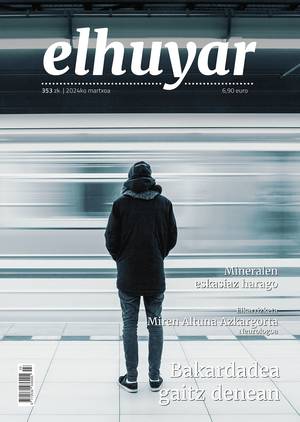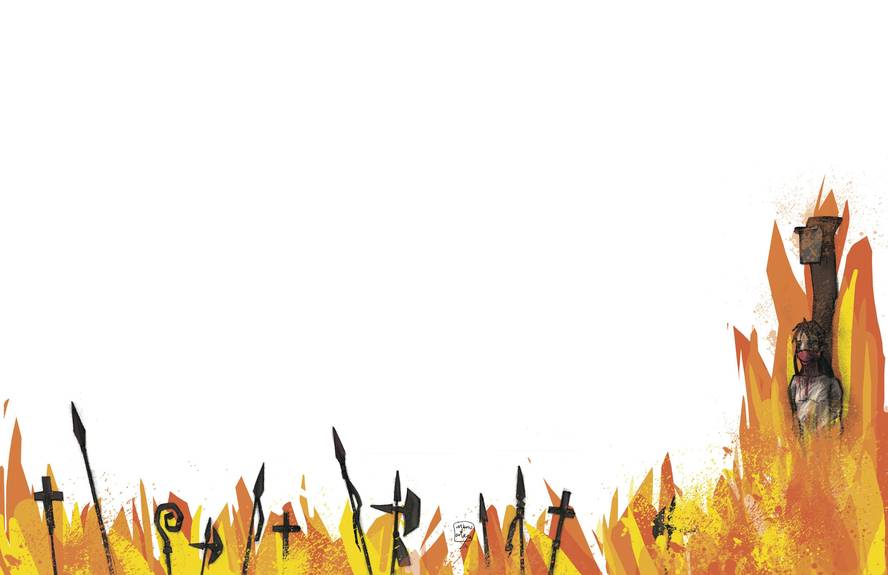Giordano Bruno, by the hand of José Ramón Etxebarria
I was not afraid of death. On February 17, 1600, Giordano Bruno was calm in Campo dei Fiori square in Rome in front of the fire prepared to burn with life. Now, as Bruno himself announced before he died, in the square is a statue of him, a monument to freedom of thought and ideas.
He was a theologian and philosopher, a very controversial man (400 years later he continues to generate controversy because his appearance in the first chapter of the new series Cosmos has provoked great debate). He defended the heliocentrism of Copernicus and the idea of infinite space of Lucrezio, relating the universe to the infinitity of the god read to Nicholas of Cusa. He added the hypothesis that the Sun was a star and that the rest of stars were suns with planets around it.
One of the reasons to condemn the fire was the vindication of the diversity of the worlds. But he was accused of many other heresies: To fight against the Holy Trinity and against Jesus, who said that Jesus was not God, but a spell, to question the virginity of Mary, to speak against the Catholic faith and its ministers, to invent...
At the last moment, Bruno refused to kiss the cross offered by the priest. And he remained calm until he disappeared in the flames. José Ramón Etxebarria, professor, engineer and physicist at UPV-EHU in the Witnesses section of Elhuyar magazine in March, said he was calm because he knew it was correct. "Dying like me... It is not death! So to die is life," said Bruno in the poem written on the eve of death. That poem has been translated and offered by Etxebarria.
Di. What is my crime? Are they suspected?
And they accuse me, knowing that I never committed a crime.
Smoke me, for tomorrow, where you fill the stake,
History will build in my honor a statue.
I know my crazy maximum condemns me.
Why? For I sought lights in Aegia;
not in your false science that diffuses thought,
composed of dogmas and rites inherited from another era,
in the ethnic book of the world universe,
that it keeps on long-lasting leaves
Blessed shoots of a productive future,
Based on justice, on reason.
However, you already know that men in their conscience
if you are looking for causes, if you are looking for the final cause,
He will soon have to replace the Bible with science.
Instead of temples, school, instead of faith, reason.
I know that frightens you,
As everyone scares you,
and that I would like to disprove myself.
Moreover, you want to deny your consciences.
Put into the mud of serbilism that causes crying...
But there too, in depth, consciences know well well
That idea is intangible, eternal, divine, immaterial...
They are not your god or your religion with change
Those who create history, but the same idea.
That he leads the life of the ossuary,
that he is the creator of the man of dust,
Who wrote the scene of Calvary in blood,
After writing tobacco with light.
But you are the same as always, the old Pharisees,
those who pray and wait in places that people can see,
In the form of faith you are false calling God, those atheists,
the dogs who were looking for a body to scratch.
What is your doctrine?, the fabric of inventions.
your orthodox, lying; your patriarch, a king;
your history is a legend, fantastic and strange;
your reason, the strength; and your law, the gold.
You have all the vices of the ancient Gentiles.
They are rare, their clumsiness.
As they are false, hypocritical, and wicked.
Like them, you want to kill the truth.
However... In vain! If there is someone in it,
I am the winner, because history will say in the future.
"I respect those who die like Bruno."
But your name… Who can say?
Oh, my luck I like a thousand times.
Dying like me… it's not death!
This is life: your life is death.
That is why there will be a winner and not in Rome... It's me!
Tell your godfather, your lord and owner.
Tell him that I have given death as a dream.
Because death is a dream that brings us to the Feast...
But not to your unfortunate god, living and passionate,
To whom, together with life, he curses man,
but to that Idea of God, which, in a thousand ways,
gives form to matter and to creation, life.
No to the god of wars, yes to the God of thought,
both the God of conscience and the God who lives in me,
To God who encourages fire, light, earth and wind,
To the God of goodness and not to the God of indefinite wrath.
Tell her not ten years of fever, delirium, and hunger
that they could not break my will.
May Peter deny the Master Jesus, but let him know:
Before the martyrdom of truth, I will not make my bet.
Enough!... I wait for you! We encourage you to finish your work.
The cowards! What stop you?... Are you afraid of the future?
Woe to me! You are vibrating. You lack the faith that I have to spare.
Look at me!... I'm not vibrating. But it is I who must die!
Translation of the poem: José Ramón Etxebarria.







